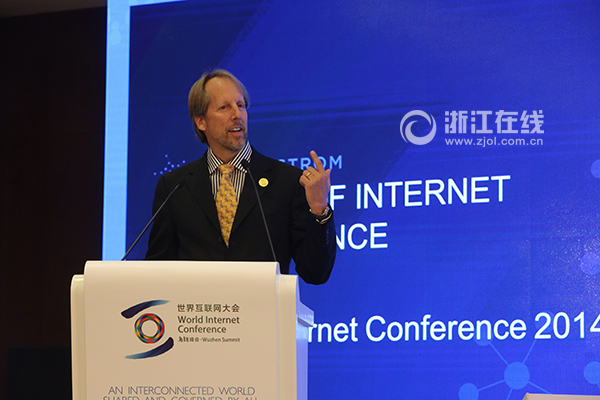THE FUTURE OF INTERNET GOVERNANCE
Remarks by
ROD BECKSTROM
World Internet Conference
Wuzhen, China
As prepared for delivery
This October, on the last morning of a visit to Shanghai, I headed out for a jog before my flight home. It was still dark as I left the hotel and the city was wonderfully quiet. I started to run, hoping not just for exercise but for a greater sense of the city.
And as I ran, I began to hear singing…faintly at first but it engaged me, drawing me toward its source.
I soon realized I was approaching a great temple. Inside I found young monks in golden robes – the source of that lyrical sound. After spending some time enjoying their heartfelt song, I explored the temple and eventually left through the front gates. I glanced back for just a moment and saw the sign. It read “Shanghai City Temple,” and I realized I had found the heart of an ancient and celebrated city.
China’s magnificent temples and the philosophical traditions behind them symbolize seven millennia of Chinese civilization. China has produced great philosophers – Lao Tzu, Shun Tzu, Confucius and many others – and we have all benefited as they shared their ideas openly with the world.
But there was also a dark period in China’s history at the end of the Qing Dynasty, when foreign powers entered into unequal treaties that harmed the rights and interests of China’s people. This was a time of closed systems and non-representation, and closed systems harm the rights of the people.
Clearly we can agree that people should have the right to engage in their own governance. Systems that are open tend to thrive. They not only protect the interests of citizens; they generate wealth and prosperity.
This is what the Internet is all about too: it is history’s greatest platform for sharing. You can share ideas, philosophies, knowledge and wisdom. You can share celebrity gossip, cat videos, and bad jokes. You can share pretty much anything you like.
There is no better example of the power of open systems than China’s miraculous economic growth since the liberalization of the 1980s. Through the great accomplishments of that era, China has become a world economic superpower.
And as China has become an economic superpower, the Internet has emerged as a powerful and constructive force. With the help of Chinese scientists and technology businesses, it brings information, communication and new ideas to every human being in China who has unfettered access to it.
The Internet changes lives. Communities thrive when they are allowed to self-assemble and to pursue their beliefs and passions online. We see this, for instance, on Weibo, RenRen and Alibaba, as well as their western equivalents. Villagers in Western China can now effortlessly communicate with their cousins in Hong Kong or Singapore or San Francisco. A student in a hut in Inner Mongolia can study aeronautical engineering or virtually any other subject. A follower of Taoist, Confucian or Buddhist philosophy can advance their learning and connect with others around the world with similar interests. The network unleashes the human spirit – when it is allowed to flourish.
And just as we see Alibaba spreading around the world with its compelling technology and services, so too the world seeks such openness in return, for reciprocity is a natural human expectation.
For people to link with the resources they need, the Internet needs to be open and unified, not fragmented – fragmentation hurts and separates. Unity allows the global system to thrive.
And while the Internet flourishes on openness, unity and common standards, it also benefits from increasing globalization for all people. Here, too, China has made a key contribution. The development of International Domain Names relied on key Chinese scientists such as Dr. James Seng and Dr. Xiaodong Lee, now CEO of CNNIC, working with experts across Asia and around the world. Over the long term, billions of Internet users will benefit from their work.
And just as China helps to shape the Internet, the Internet helps to shape a better China and a better world.
While major world powers have commonly had different views throughout history on national security issues, we have the opportunity in this networked world to work on differences with less violence and more communication, and with the inherent transparency that the network itself delivers.
For the Internet to remain unified, a degree of cooperation is needed through open stakeholder organizations such as ICANN and the Internet Engineering Task Force, which China contributes to and supports. During my tenure as ICANN’s CEO, I was delighted to see the growing engagement of many parts of the Chinese government, including MIIT, CONAC, SCOPSA and SCIO, as well as non-governmental organizations such as the Internet Society of China and CNNIC. Now there is also a Cyberspace Administration, and it is encouraging to hear Minister Lu Wei’s remarks in support of ICANN and the model of Internet governance that engages all stakeholders.
China also has a role in helping to make Internet coordination bodies more global, and hosting this dialogue among many – albeit not all – key parties is another constructive step.
In addition, China’s number one netizen population and leading role in technology development and manufacturing lead to big responsibilities. Great nations become greater by upholding the highest values and serving the world at large. I am encouraged to see China’s leadership in hosting this historic conference. There is much more that can and should be done.
China’s increasing engagement in Internet governance benefits not just China but the world. This is what the Chinese people – and people around the world – deserve.
Thank you.

